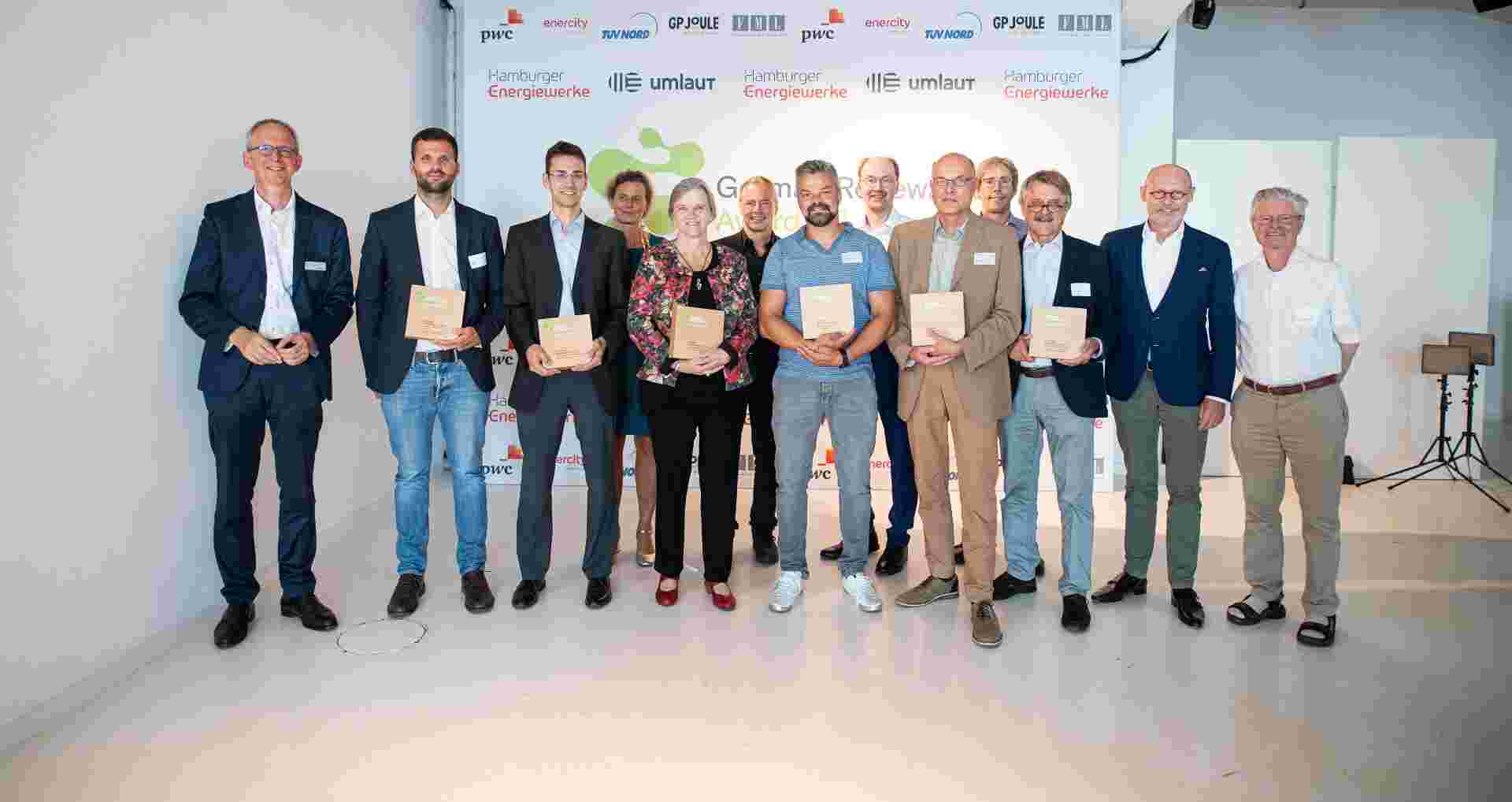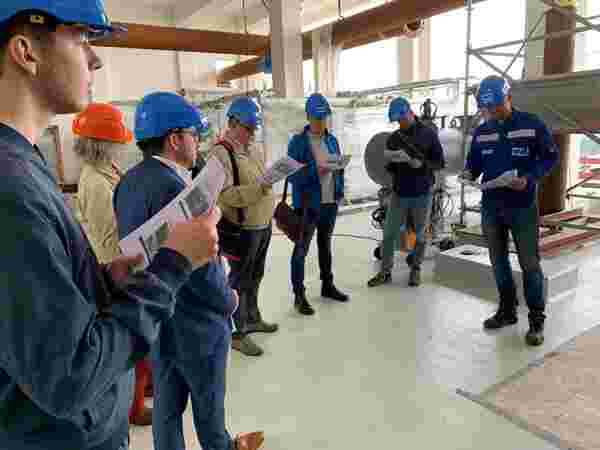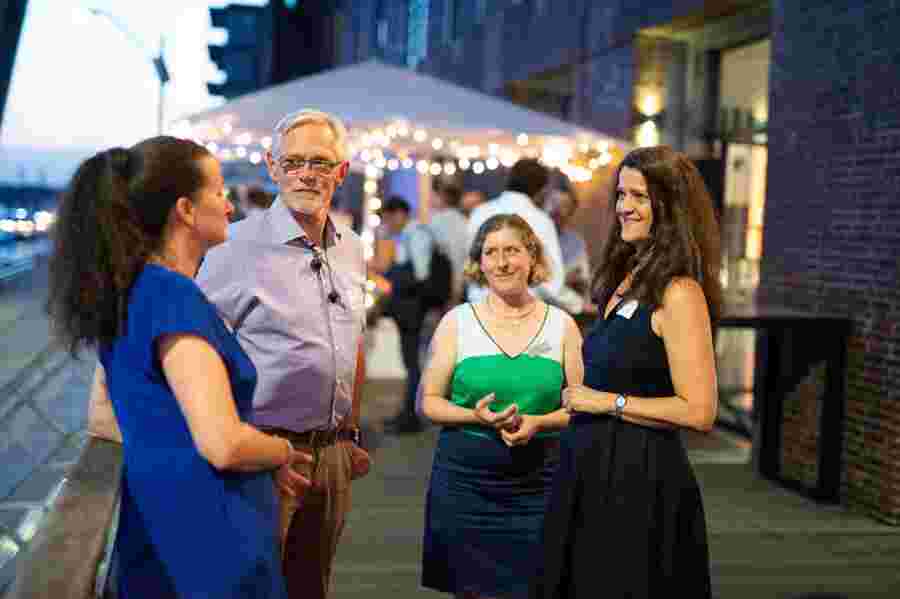
German Renewables Award 2022 presented in six categories
Groundbreaking projects honoured, along with the creative minds behind the energy transition
Container for the scroll indicator
(Will be hidden in the published article)From zero-emission hydrogen ships, through local heating concepts in modern residential areas, to world-leading climate research – the winners of the German Renewables Award displayed impressive innovative skill and courage when coming up with their groundbreaking ideas. A total of 47 companies and individuals submitted entries for the prestigious industry award.
Project of the Year
In the Project of the Year category, the energy-efficient Heidrehmen district won the German Renewables Award 2022. Bauverein der Elbgemeinden eG works with Hamburger Energiewerke to holistically implement various energy-savings measures in Hamburg-Iserbrook as part of this concept, such as basement ceiling insulation, renovation of the local heating network, combined heat and power plants and a tenant electricity model.
Other entries in the Project of the Year category included MMG’s solar refrigeration and Green GmbH with a concept for avoiding CO2 emissions in existing properties.
Product innovation of the Year
A split rotor bearing for the direct replacement of a wind turbine nacelle from Schaeffler AG won the Product Innovation of the Year category. Spherical roller bearings currently account for the majority of the world’s wind turbine rotor bearings - approx. 455 GW of the 740 GW in operation. In older turbines, many spherical roller bearings fail to achieve the intended service life of 20 years. For the first time, this split, asymmetric spherical roller bearing allows the rotor bearing to be replaced directly in the nacelle, thereby minimising expensive, time-consuming crane capacity
Other nominees for Product Innovation of the Year included IESS-101.90.996.20A developed by E-Stream for a sustainable energy storage solution and Olmatic Power Tracking from Olmatic GmbH that provides dynamic energy distribution and charging infrastructure in industry.
A total of ten companies submitted entries.
Student thesis of the Year
Patrick Kloss, Masters graduate from Helmholtz-Zentrum Hereon and University of the Federal Armed Forces Hamburg, won the German Renewables Award in the Student Thesis of the Year category with the development of a digital twin for an existing solid-state hydrogen storage system.
Other nominees included Olessya Kozlenko with an optimisation model for the layout of the KEBAP energy plant, a project in Hamburg-Altona, as part of their Masters thesis at HAW Hamburg and Patrick Schönknecht from Steinbeis (an international network of transfer enterprises) and Chemnitz University of Technology with his Masters thesis on the thermal use of water from a former mining lake to heat a holiday park. A total of seven students submitted entries for the German Renewables Award.
Hydrogen innovation of the Year
The hydrogen infrastructure concept and maritime use of hydrogen in Cuxhaven developed by Turneo GmbH won the newest category, Hydrogen Innovation of the Year. The aim is to produce green hydrogen and then use it in coastal mobility for heavy maritime cargo – a basis for additional projects in the Elbe-Weser triangle
In addition to Turneo GmbH, the shortlist also included Lufthansa Technik AG with its hydrogen aviation lab for the use of hydrogen in ground handling at airports and Aurubis AG with hydrogen-based production processes for copper.
Lifetime Achievement
In the Lifetime Achievement category, the jury chose to present Prof Daniela Jacob with the German Renewables Award. Prof Jacob is a meteorologist and Director of the Hamburg-based Climate Service Centre Germany (GERICS), as well as a visiting professor at Leuphana University Lüneburg. Her research focuses on regional climate modelling, the water cycle and the climate service, as well as on adapting to the impact of climate change. Prof Jacob was one of the lead authors of the IPCC’s Fifth Progress Report and coordinated the 1.5°C Global Warming Special Report published in 2018.
Journalism Award
A report on the ‘Smart energy city’ of Wunsiedel in the Fichtel Mountains won the 2022 Journalism Award. The ‘Look at this little town’ (author: Yves Bellinghausen) article published in the ‘brand eins’ (brand one) business magazine describes how the small Franconian town managed to gradually become completely self-sufficient with renewable energy, thereby generating enthusiasm for the ‘Wunsiedler approach’ among experts around the world.
Other nominations in this category included Stefan Schultz and Claus Hecking with their ‘New German cell’ article published in spiegel.online and Sebastian Gubernator, Welt am Sonntag, with ‘Gondolas of hope’. A total of 16 journalists submitted entries.


